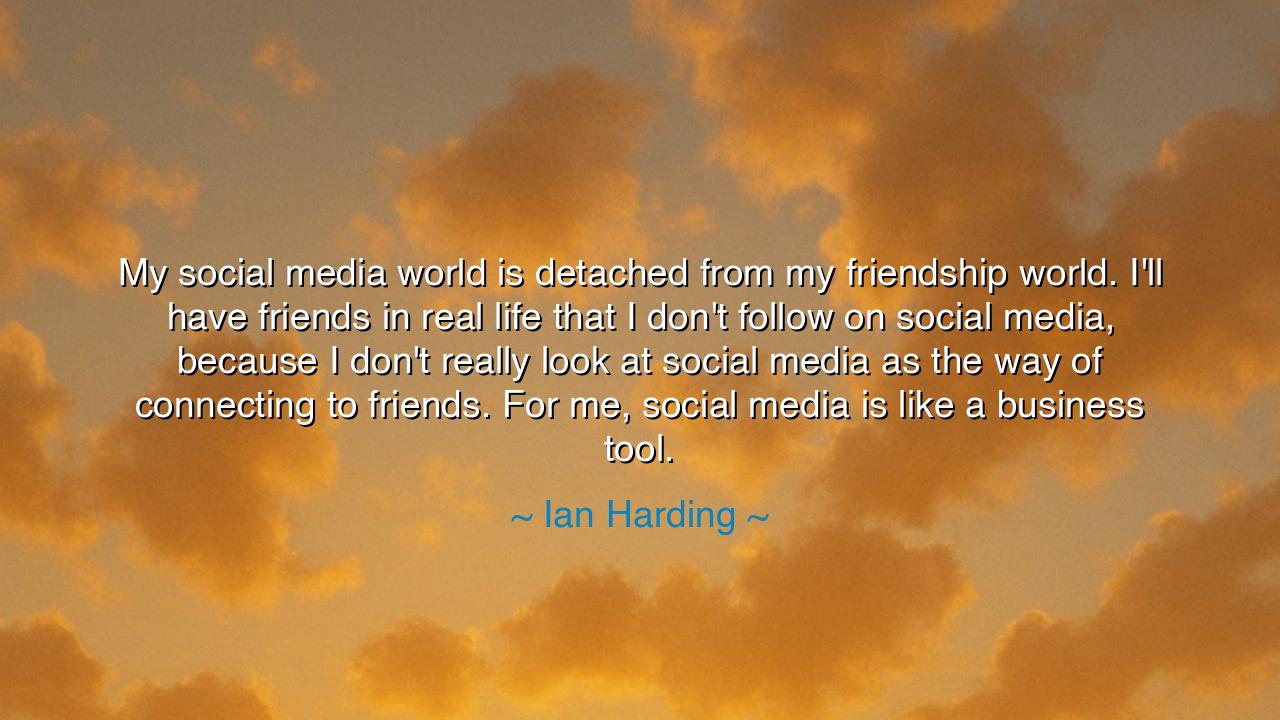
My social media world is detached from my friendship world. I'll
My social media world is detached from my friendship world. I'll have friends in real life that I don't follow on social media, because I don't really look at social media as the way of connecting to friends. For me, social media is like a business tool.






"My social media world is detached from my friendship world. I'll have friends in real life that I don't follow on social media, because I don't really look at social media as the way of connecting to friends. For me, social media is like a business tool." These insightful words spoken by Ian Harding carry with them a profound reflection on the nature of friendship and the evolving role of social media in our lives. Harding suggests that the deep, meaningful bonds we form as friends cannot be captured in the digital realm, where connections often exist as superficial or transactional exchanges, governed by likes, posts, and comments. Instead, he highlights the distinction between the virtual world—where social media serves as a business tool—and the real world, where true friendship thrives on face-to-face interaction, shared experiences, and the kind of deep, authentic communication that no screen can replicate.
In the ancient world, the concept of friendship was held in high regard, and its value was seen as transcendent—above material pursuits or passing trends. Aristotle, in his Nicomachean Ethics, spoke of friendship as a relationship based on virtue, mutual respect, and a shared pursuit of the good. For him, true friends were those who sought not only their own happiness but the happiness of the other. Such friendships were founded on the strength of face-to-face interactions, where two people could speak openly, share deeply, and support each other through life’s challenges. Aristotle would have likely viewed the rise of social media with skepticism, understanding that while it can create surface-level connections, it cannot replace the depth of authentic human engagement.
In the same way, consider the relationship between Socrates and his students. Socrates did not seek to impart wisdom through written words or messages broadcast to the masses; instead, he engaged in dialogue, questioning and discussing with his students in person. His greatest disciples, such as Plato, were not influenced by Socrates’ writings alone, but by the personal connection and the way they engaged with him as individuals. Socrates sought to connect with people on a deeply human level, encouraging them to examine their lives and the truths they held through face-to-face discourse. In much the same way, Harding points out that social media, though a tool for communication, cannot substitute for the real-life friendships forged through true interaction and shared moments.
Yet, we live in an era where social media has become an undeniable force. It has redefined the way we communicate, breaking down barriers of distance and time, allowing us to stay connected with people across the globe. However, Harding’s quote is a cautionary reminder that while social media may provide the appearance of connection, it does not replace the emotional depth of real friendships. Social media often fosters relationships that are filtered, curated, and presented in a way that serves the interests of the self. It may allow for business connections, but it cannot replicate the genuine understanding and empathy that occur when friends spend time together in person, exchanging thoughts, ideas, and emotions without the constraints of a digital platform.
Consider the friendship between David and Jonathan, two figures from the Bible whose bond was tested by political strife and personal sacrifice. Their friendship was not mediated by any outside force or filtered by the limitations of social media. It was a relationship based on loyalty, trust, and a shared commitment to one another’s well-being. Despite the pressures from David’s rise to power and Jonathan’s complex role as the son of King Saul, their friendship remained steadfast. They communicated openly, shared their fears and hopes, and demonstrated a deep, selfless connection. Their relationship offers a model of friendship that cannot be reduced to a collection of curated posts or tweets; it was based on the truth and vulnerability of real-life interactions.
The lesson in Harding’s words is clear: social media may have its place in our modern lives, but it cannot replace the real-life friendships that nourish and sustain us. Friendship requires more than just online communication—it demands presence, vulnerability, and empathy. It thrives in the moments of shared laughter, tears, and support that only come from being physically present with someone, sharing the same space and the same experiences. The connections we form online are not without value, but they are limited. True friendship flourishes in the world of the tangible, where conversations are unfiltered, and where the connection goes beyond the surface.
In our own lives, we must recognize the value of offline friendships and actively nurture those bonds. Let us not allow the allure of social media to replace the true, deep connections that come from spending time with those who matter most. While social media can serve as a tool for business, networking, or keeping in touch with distant acquaintances, it cannot fulfill the deeper needs for companionship and intimacy that we experience with our closest friends. Let us invest in the friendships that require our time, our presence, and our genuine effort, for it is these relationships that will provide us with the strength, support, and love we need to navigate the challenges of life.






AAdministratorAdministrator
Welcome, honored guests. Please leave a comment, we will respond soon